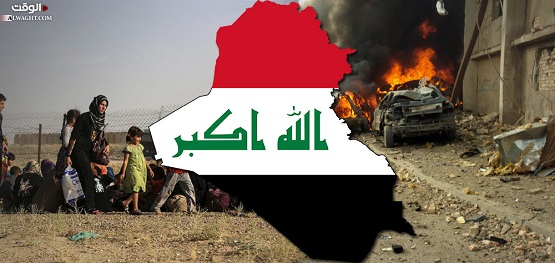During over three decades of Baathist party's rule in Iraq, the Iraqi people suffered severely. Under rule of the dictator Saddam Hussein, a majority of the Iraqis lived a nightmarish daily life. Silencing the opposition voices was a daily scene, with many tortured, and many more killed.
The Saddam Hussein's adventurism led to fighting two wars against the neighbors, one in the 1980s against Iran and the other against Kuwait in 1990, resulting in killing of hundreds of thousands of Iraqi people. The Iraqis' misery looked quite relentless as even after Saddam's toppling in 2003 by the sweeping US invasion, the terrorist groups, many of them founded and led by the overthrown Baathists, compounded the already-messy situation in Iraq on the strength of a wide range of supports coming from both hostile Western and regional sides.
Nurturing and rolling out ISIS terrorist group, the most barbaric among the precedent radical groups which is taking its last breathes these days in Iraq after major ground losses, was one of the largest terror projects against Iraq launched ever. The Iraqi people are yet to resolve tremendous troubles caused for them by arrival of the terrorist group to the country and seizing vast swaths of their territories as well as already existing setbacks. They now have to fully eradicate ISIS on their soil, launch a much-needed campaign of political and administrative reforms, reconstruct the massively destroyed parts of the country that were liberated from ISIS grasp, and counter upcoming hostilities by the ISIS creators who now see themselves as losing parties on the stage of Iraq.
Such a hard work of the Iraqis requires several significant matters:
First, Iraqi leaders need to be ready and determined to step towards big deals. Facing the amassed problems takes honest and proficient politicians who guard against any ethno-sectarian views that can well handicap any resolution to serve the whole nation while uninfluenced by sectarianism. For a long time, Iraq suffered enough from the corrupt politicians who only put premium on religious tendencies or fought for partisan or even personal power. Iraq does not appear to afford having corrupt law enforcers and the next stage will only take seriousness and purity of intent to make sure that the difficult work will be accomplished well.
Second, any steps towards dealing with the conundrums ahead will take pluralism and prioritization of the national interests. The leaders need to respect the collective views and solutions, without pursuing partisan, or personal, or sectarian pathways. If parties insist on individual viewpoints with disregard of the group ways and even use force to impose their ideas on the others, the outcome could be further divisions and struggles, a status Iraq has been grappling with and people have become fed up with for a long time. A showcase of diversity, the Iraqi society needs respect to collective views and national approaches more than the unanimous societies.
Third, undergoing the ordeal of terrorism eradication and piecing together the deeply-divided Iraq will take outstanding astuteness and profundity. The leaders should perfectly recognize the priorities of the society as the people are now in urgent need for security, calm, and better living conditions. The officials should work in best interest of the Iraqi nation without heeding to the risky foreign agendas for internal use.
But this perspicacity is not only crucial to the officials, people need it too. This is for them to know their strong points including the power to make changes through votes which at the end of the road decide who leads the country. They have to cultivate a transparent picture of the conditions in order to steer clear of political traps that might be laid by the abusive political figures.
And fourth, submission to the rule of law and avoiding monopolism. Parties need to make sure that law is the reference. There should be a respect to the law and constitution, and any resistance to the law enforcement bodies of the state can bear confrontation, and chaos can ensue which will definitely be antipathetic to the national interests. Wherever critical conditions show face, they can be deterred by reference to the constitution-backed law, otherwise unrepairable outcomes are inevitable. In Iraq where diversity is the defining feature of the society and various sectarian and religious groups are inclined to impose their vision on the others, the only solution to guarantee security and welfare is submission to law. Reviewing the faulty laws, not embracing lawlessness, can help better the situation.
LINK: https://www.ansarpress.com/english/7957
TAGS:































 Violation of the sovereignty and rights of afghan citizens by America
Violation of the sovereignty and rights of afghan citizens by America




